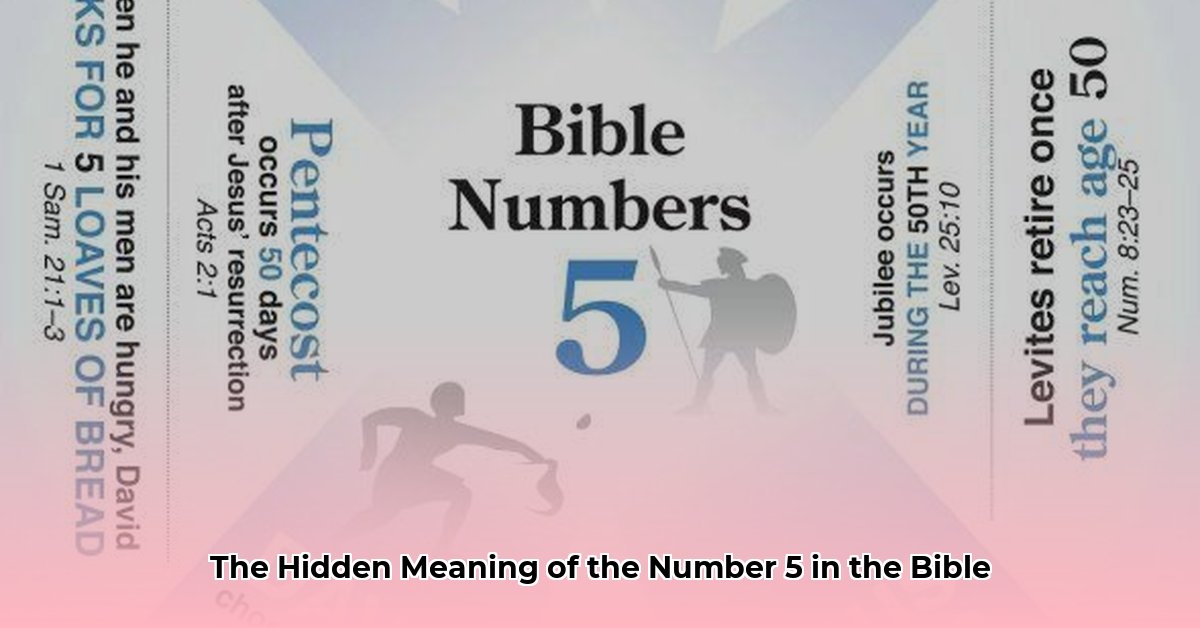The number 5 appears in numerous pivotal moments throughout Scripture, often associated with grace, God’s law, and completeness. This article explores the potential significance of 5 in the Bible, offering diverse interpretations and encouraging further exploration.
Five’s Symbolic Resonance: Grace, Law, and Completion
The number 5 resonates with symbolic meaning in biblical contexts, often linked to God’s grace, the foundation of divine law, and the concept of completeness. While not an exact science, examining these connections can enrich our understanding of Scripture. Five, unlike the number ten often associated with wholeness, may instead suggest a journey towards completion, a path illuminated by God’s grace.
Key Symbolisms of 5
Grace and Favor
The number 5 is sometimes associated with God’s grace and favor. Like the five fingers of a hand, it can symbolize God’s reach extending towards humanity, offering blessings and support. This connection also suggests the five wounds of Christ, powerful emblems of his sacrifice.
The Torah: Foundation of Faith
The Torah, the first five books of the Bible (Genesis, Exodus, Leviticus, Numbers, and Deuteronomy), forms the bedrock of Jewish faith and tradition. These books establish the core narrative of creation, God’s covenant with Abraham, and the giving of the law, providing a foundation for understanding God’s relationship with humanity.
Completeness in Progress
Some scholars suggest 5 represents a state of incompleteness striving towards wholeness, particularly when contrasted with the number 10, often symbolizing complete fullness or perfection. This perspective suggests that 5 signifies a stage in a spiritual journey, an ongoing process of growth and development facilitated by divine grace.
The Five-Fold Ministry: Equipping the Church
Ephesians 4:11-12 outlines the five-fold ministry: apostles, prophets, evangelists, pastors, and teachers. These diverse roles, like the five fingers of a hand working in concert, contribute to the growth and edification of the church. The number 5, in this context, might emphasize the collaborative nature of ministry and the diverse gifts within the body of Christ.
Five in Biblical Narratives
David and Goliath: Courage and Provision
In the iconic story of David and Goliath (1 Samuel 17), David chooses five smooth stones to face the giant. These stones can be interpreted as symbols of God’s provision, demonstrating that even seemingly small resources, empowered by faith, can lead to victory. Some scholars also connect the five stones to the five books of the Torah, suggesting that David’s faith and courage were rooted in his understanding of God’s word.
Feeding the 5,000: Abundance and Sufficiency
The miracle of the feeding of the 5,000 (Matthew 14:13-21) showcases Jesus’s power and God’s abundant provision. Jesus takes five loaves and two fish and miraculously multiplies them to feed a multitude. This event underscores God’s ability to take something seemingly small and make it more than enough, echoing the boundless nature of divine grace.
Varying Interpretations and Cautions
It’s crucial to approach biblical numerology with a balanced perspective. While exploring symbolic meanings can be enriching, it’s important to avoid overly speculative interpretations. Some scholars caution against assigning definitive meanings to numbers, emphasizing the importance of focusing on the broader message and context of the biblical text. Ongoing research continues to shape our understanding of biblical numerology.
Quick Reference: Symbolism of 5
| Symbolism | Scriptural Reference |
|---|---|
| Grace/Favor | General concept; Five Wounds of Christ |
| Torah/Foundation | Genesis – Deuteronomy |
| Completeness (in progress) | Compared to 10 (fullness) |
| Five-Fold Ministry | Ephesians 4:11-12 |
| Provision/Courage | David and Goliath (1 Samuel 17) |
| Abundance | Feeding of the 5,000 (Matthew 14:13-21) |
Cultural Context (Optional)
The number 5 held significance in some ancient Near Eastern cultures, sometimes associated with deities or cosmological principles. While these cultural connections may provide additional context, it’s important to avoid imposing these interpretations onto the biblical text without careful consideration.
Conclusion
The number 5 appears in significant biblical narratives and may hold symbolic meanings related to grace, law, and the journey towards spiritual completeness. While different interpretations exist, exploring these possibilities can deepen our understanding of scripture. Further research into biblical numerology and related topics, like the deeper meaning of the Torah or other significant numbers in the Bible, can enrich one’s faith journey.
- Best Mindfulness Books for Anxiety, Sleep, and Daily Peace - January 29, 2026
- Books On Mindfulness For A Happier, More Present Life - January 28, 2026
- Essential Meditation Books for Beginners and Experienced Practitioners - January 27, 2026
















